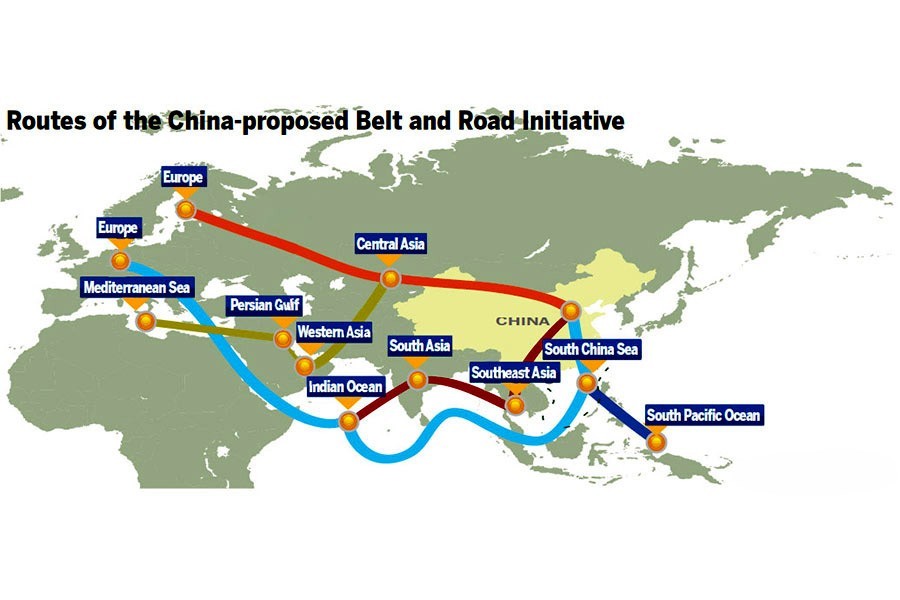Prime Minister Sheikh Hasina recently said the world has become a global village and for economic development, every nation needs connectivity. She said China, India, Bangladesh and Myanmar already signed an agreement to establish connectivity, known as Bangladesh-China-India-Myanmar Economic Corridor (BCIM-EC). The Prime Minister's comments came immediately after her party formed government for the third straight term.
With BCIM-EC in place, the Prime Minister said, none should worry about the China-led One Belt One Road (OBOR) as it would benefit all neighbouring countries of South Asia. It would help raise trade. If there is any issue to worry about, it can be solved through bilateral and multilateral discussions. The decision to go with the OBOR initiative is a natural choice for the country. Chinese President Xi Jingping's visit to Dhaka in 2016 ushered in US$ 24.45 billion in investments -- the largest by a country in the nation's history.
Despite criticism from both home and abroad, the government's decision was hailed by many circles as a pragmatic step in becoming part of something that surpasses the Marshall Plan which the US launched for the reconstruction of a devastated Europe after World War II.
The newly set-up OBOR follows the trail set up by other great powers and their ascendance to economic supremacy in the global order. Today, China appears to be following the examples set by the UK and later, the US, in their global expansion through penetrating into other foreign territories to essentially sell goods that could not be consumed in their respective domestic markets.
As the people move into the 21st century, the mode has changed and the one offered by China today is much bigger than the world has ever seen. The success of OBOR is a testimony of garnering support from all over the world.
The original Silk Road came into being during the westward expansion of China's Han Dynasty more than 2,100 years ago. It forged trade networks throughout what are today the Central Asian countries of Kyrgyzstan, Tajikistan, Kazakhstan, Uzbekistan, Turkmenistan and Afghanistan, as well as modern-day Pakistan and India to the South. Those routes eventually extended over 4,000 miles to Europe.
Under the One Belt, One Road initiative, China is now working to build an economic land belt that includes countries on the original Silk Road through Central Asia, West Asia, the Middle East and Europe, as well as a maritime road that links China's port facilities with the African coast, pushing up through the Suez Canal into the Mediterranean.
A brighter prospect of the OBOR initiative is now seen with the interconnected and simultaneous development of multiple roads, including the Blue Economy Corridor, the Sky Silk Road and the Digital Silk Road.
In 2017, Bangladesh's bilateral trade value reached $16 billion, 5.8 per cent higher than the year before, with China remaining the number one trade partner of Bangladesh. The contracts signed between Bangladesh and Chinese companies reached $10.4 billion-- second in the South Asian region. Chinese investments stand at $ 85.94 million, and $ 380 million in terms of stock.
It is anticipated that the proposed Silk Road Economic Belt and the 21st Century Maritime Silk Road would bring important opportunities in achieving Bangladesh's goal of becoming a middle-income country by 2021 and a developed country by 2041.
It should be remembered that the OBOR is not only an initiative by China, it is an initiative of other countries as well. It looks like a super-continental initiative as it included both Asia and Europe. OBOR involved 68 European and Asian countries which account for 60 per cent of the global population and 40 per cent of the global gross domestic product.
In fact, an opportunity has been created for Bangladesh because of the two rising global economies -- India and China. Such big economies powers account for $20 billion of Bangladesh's $80 billion foreign trade.
Of the amount, Bangladesh imports goods worth more than $12 billion from China and more than $6 billion from India a year. However, shipments to the two countries from Bangladesh are worth a little over $1.5 billion a year: about $800 million to China and $700 million to India.
Yet Bangladesh has the opportunity to export more to the two countries as China's annual import value is $2,000 billion and India's $500 billion.
Bangladesh needs to improve the supply capacity of goods and the logistics and increase people-to-people contact for gaining more benefits from the giant economies. There is a need for seamless transport connectivity and turning the roads into economic corridors to reduce the lead time.
The establishment of rail link between China and Europe is expected to reduce the lead time substantially, and Bangladesh can also link the special economic zones and deep sea port with the OBOR initiative.
Bangladesh has been developing four ports -- Chattogram, Mongla, Payra and Sonadia deep-sea ports -- so that the country can be connected with the initiative. If Bangladesh can invest between $18 billion and $20 billion in infrastructure development, it will be able to attract $300 billion to $320 billion of FDI in the next 17 to 18 years.
Vietnam, for example, spent 10 per cent of its GDP on infrastructure over the past 10 years. In the last five years, Vietnam was able to attract $60 billion in FDI in contrast to Bangladesh's $3-4 billion. Bangladesh needs to quickly operationalise the special economic zones.
Bangladesh has already received positive outcomes from its warm ties with China in recent times. For instance, in addition to Chinese domestic banks, the Asian Infrastructure Investment Bank (AIIB) will be an important financial source for Bangladesh's economic development needs.
All said and done, the OBOR could herald a new era of win-win situation for globalisation. Bangladesh needs to utilise its geographic location and harness the potential benefits from such initiative.


